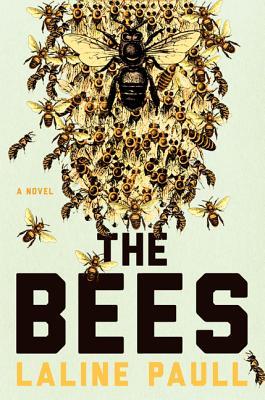I first became aware of this title because it was featured on the May 2014 Library Reads list:
I agree with the above statement completely. But my sound bite review is-- The Bees is a fascinating look at life inside a bee hive in the tradition of Watership Down meets Divergent.“This book is set entirely in a beehive, but the novel and its characters are so beautifully rendered that it could have been set anywhere. Societal codes and social mores combine with the ancient behavior rituals of bees, bringing forth a remarkable story that is sure to be a book club favorite.”—Ilene Lefkowitz, Denville Public Library, Denville, NJ
Literally. It is just like the wonderful world created by Richard Adams in his classic story of what life is really like in a rabbit warren. Instead, here you see what happens in a bee hive from the social hierarchy, to the day to day living, to the fighting (outside enemies and among themselves) in this female driven world.
The Divergent part comes in to play in that the entire story is from the perspective of Flora 717, a divergent bee. She is born of the lowest kin, a Flora-- the waste removal kin, but she is different; in fact, she is almost killed at birth because she is deviant.
What follows is Flora’s tale. We see the hive and how it functions through the eyes of this rare bee who is able to move throughout the complicated strata of the bee world. This is a female driven story in what is a female driven culture. What I liked about this is that it had the full range of female characters from heroes to villains, from strong to weak, but it was all done without an "in-your-face girl power" that I tend to find annoying in both fiction and nonfiction. As a result, men and women can enjoy this book.
You also don’t really need to know a lot about bees to enjoy the novel because Flora is learning how to be a bee herself over the course of the novel. This is her story, through her eyes. We learn with her about how the work is divided, how they survive, how they fight, and how they pollinate our flowers and crops for us. We see the negative effects of humans on the world of bees (and all nature), but again without a heavy hand. Paull is simply letting Flora live and through her fascinating life, we can’t help put be forced to pause and contemplate things in our world like the environment, to war, to different forms of government.
The bees have a mantra to keep them all in line, “Accept, Obey, and Serve.” They repeat it over and over. They serve the Queen, the only female (in a hive full of them) who may breed. Juts this scant bit of information hints at the vast thought provoking questions at the heart of this novel.
While the novel is thought provoking, it is also briskly paced-- which is not always the case with all thought provoking tales. Flora lives a year and the book is barely over 300 pages. Things move here. Each time there is a lull, we get action, violence, adventure...something happens to keep the story moving and the reader turning the pages.
But the action all builds purposely. This is an extremely well plotted tale with everything that happens to Flora 717, everything she observes, everything that she does-- all of it ends up mattering in the end. I was satisfied that the ride Paull took me on was both fun and worth my time.
I should note that humans do appear although they only speak in the prologue and epilogue. In these quick appearances (4 pages max), we learn quite a bit about the man who kept the bees in Fora 717’s hive for many generations of bees. In fact, I found the ending of Flora 717’s story and the closure of the human side of the story right after make for an extremely satisfying double ending.
I am someone who praises authors for when they know how to end their stories. This may be Paull’s first novel, but she has nailed a just about perfect story from start to finish. This would be a great summer reading option, especially is read outside near flowers.
The Bees is a great choice for readers from high school up. I think teenagers would learn quite a bit about world politics and government as it stands in the 21st Century by reading this book. The Bees is a product of its time, just as Animal Farm is of its time.
Finally, one of the things I loved about this story is that is complete in one volume. This is the story of Flora 717 from her birth to her death. Unlike many of the dystopian fiction novels today, but very much like the classic stand alone titles, The Bees is NOT a series. I really enjoyed that about it, but others may be disappointed that it is a one shot.
Three Words That Describe the Book: dystopian, anthropomorphism, fascinating
Readalikes: As I mentioned above, this is Watership Down meets Divergent-- totally a perfect read for someone who finds that statement intriguing.
Other thought provoking dystopian stories that it reminded me of:
- Animal Farm by George Orwell (I think The Bees is actually a better choice to get at some of the same ideas for today's students.)
- The Handmaids Tale by Margaret Atwood (Dystopian, breeding issues, strong woman with opposition views who changes a society)
- Fahrenheit 451 by Ray Bradbury (I can’t say why other than it just had a similar feel to me; the regular hero who has divergent views and tries to change society)
This is a perfect read for anyone who likes classic dystopian fiction. For more of these titles click here for the Goodreads portal to all things dystopian.

No comments:
Post a Comment